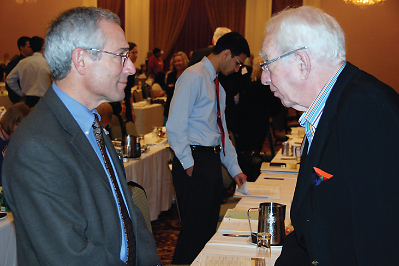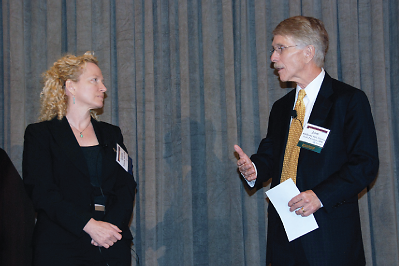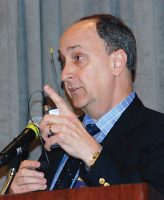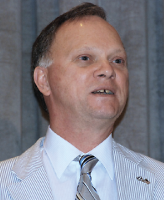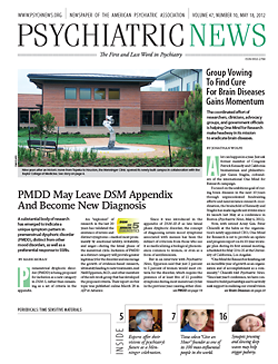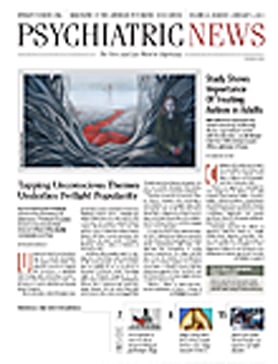Psychiatry and neuroscience need revised agendas, said speakers at a symposium in Houston who looked at the intertwined disciplines from the views of consumers, clinicians, and researchers.
The April 12 event marked the opening of the new Menninger Clinic, now affiliated with the Department of Psychiatry at the Baylor College of Medicine (see New Menninger Clinic Is Centerpiece of Ambitious Growth Plans).
Former U.S. Rep. Patrick Kennedy reminded the audience that mental health was a part of general health. “If you’ve got something from the neck up, you have to go down the hall.”
“We are reimbursed for concussions or lacerations that happen when driving drunk, but not for what brought you into the E.R.,” said Kennedy, who identified himself as a consumer of mental health care. “If we reimbursed for diabetes care the way we reimburse for mental health care, we’d pay for amputations or blindness but not preventive care. The current model of care is inefficient.”
Mental health care insurance parity—which has been codified in federal law but has been poorly implemented—is an issue like the civil-rights movement, he said. “We need to end treatment of mental illness as segregation. It’s health care for the whole person.”
That approach should appeal to both liberal Democrats and conservative Republicans—caring for people and saving money, he noted.
Kennedy is the son of the late Massachusetts senator Edward M. Kennedy and the nephew of President John F. Kennedy. He recalled the latter’s speech in 1962 promising that the U.S. would send men to the moon and back by the end of that decade.
“We did it because we put our mind to it,” said Patrick Kennedy. “Neuroscientists are the astronauts of our age. What you do cannot be underestimated.”
Numerous other challenges face neuroscience, said other speakers.
Research has led to major advances in heart disease and cancer, improving prevention and reducing mortality, said Thomas Insel, M.D., director of the National Institute of Mental Health (NIMH). The same cannot be said for research on mental illness.
“Prevalence and mortality have not decreased for any [mental] illness,” said Insel. “Diagnosis is by observation, etiology is unknown, prevention is generic, and treatment is by trial and error.”
When combined with other conditions, mental illness is the single largest driver of health care costs, Insel noted.
Mental illnesses are brain disorders but not focal lesions, he said. “Not dead cells but problems of brain circuitry, and we now have the tools to look at how brain cells are connected structurally and functionally.”
For instance, schizophrenia may be not one disorder but 200 that end in common final pathways, he said. “Psychosis may be just a late stage in the process, so we need to look upstream.”
Looking upstream may give clues for preemptive interventions. NIMH is now developing its Research Domain Criteria, for example, which will combine careful clinical observation, biomarkers, cells, circuits, and family history. The goal is to transform treatment so that it is based on pathophysiology, can be applied preemptively, is personalized, and has an impact on public health, he concluded.
“Our profession affects major mental health problems,” said Laura Roberts, M.D., M.A., a professor and chair of the Department of Psychiatry and Behavioral Sciences at Stanford University School of Medicine.
Hundreds of millions of people worldwide cope with mental illnesses, she said. By 2020, mental illness will be the leading cause of death and disability. These statistics are particularly alarming because many people do not seek treatment.
“Stigma is a powerful barrier to care,” Roberts said. As an example of the pervasiveness of stigma, she cited a survey of surgeons in the United States that found that 15 percent had thoughts of suicide, but many failed to enter treatment because they feared disclosure would damage their careers.
This increased need for care and the stigma often attached to receiving it come at a time when neuroscience is making key research advances, Roberts pointed out. The familiar descriptive approach to neuropsychiatric illnesses is now benefitting from new insights drawn from studies of brain functioning and structure, neural networks, genetics and epigenetics, and epidemiology.
“There is also a new understanding of the relationship between physical illnesses, mental illnesses, and addiction-related disorders,” said Roberts.
In fact, psychiatry could be seen as a home for “truly modern science,” she said. Psychiatry is interdisciplinary and innovative. Transformative new paths, like optogenetics and epigenetics, are emerging.
“At the same time, we are an embattled and divided profession,” she suggested. “Biology and psychotherapy are placed in opposition to each other, even as we learn that those treatments work well together.”
In addition, psychiatry is mocked or disparaged in the media. It is seen as mysterious and complicated.
Despite an obvious need, not enough young people are entering the profession, she said. From 2007 to 2011, only 40 PGY-1 residency slots were added in psychiatry. “This year 182 out of 189 residency programs did not fill with U.S. students,” she said. “Restoring trust in the profession means remembering that we are first physicians. We live in the house of medicine and should use our expertise in the service of others—providing excellent clinical care, developing new knowledge, helping our colleagues, and assuring the clinical and ethical standards of our profession.”
Glen Gabbard, M.D., a clinical professor of psychiatry at Baylor; and Alan Schatzberg, M.D., a professor of psychiatry and behavioral sciences at Stanford University School of Medicine, also spoke at the symposium. Coverage of their presentations will appear in the next issue.

Researcher Follows Leads in Search for Antidrug Vaccine
Stimulating the immune system with a vaccine against drugs of abuse could open doors to therapy and prevention, said Thomas Kosten, M.D., a professor of psychiatry, pharmacology, and neuroscience and associate vice president for research at Baylor College of Medicine in Houston.
Kosten spoke at a symposium in April in conjunction with the opening of the new Menninger Clinic.
The body won’t create antibodies to the drug alone, but it can be fooled by tacking a drug molecule—say, cocaine—onto a protein such as a tetanus virus, explained Kosten. The immune system makes an antibody to the cocaine-protein combination, which then neutralizes the drug in the blood, preventing it from reaching the brain.
Vaccines can be designed to act against any drug except alcohol. “Alcohol is a small two-carbon molecule that occurs throughout the body,” he said. “Any antibody to it would lead to massive self-directed damage from an autoimmune reaction.”
Antidrug vaccines can serve as adjuncts to therapy, said Kosten. The vaccine controls the effects of the drug while the patient participates in psychosocial intervention.
Current vaccines are not yet as efficient as those aimed at infectious diseases, however. In clinical trials, Kosten administered three to five injections of vaccine over two to three months. Antibodies remained at clinically useful levels for three months after that, although a booster shot was needed every few months to maintain antibody levels. Up to 75 percent of patients produced an effective antibody response.
He is now working on newer vaccines that will be five times more efficient than the one he is now using.
Kosten is also studying genetically engineered enzymes that chemically inactivate cocaine in the bloodstream 10,000 times faster than the natural enzyme in humans does. Combined with the vaccine, he “could not put enough cocaine into test animals fast enough to kill them.”
Kosten’s research reveals something about addicts as well as addiction.
The drug users in his study who got the placebo were certain they had received the real drug, because the alum used as an adjuvant caused some injection-site pain, he said. “And the ones who got the real vaccine said they had to find a new dealer, because the drugs they were buying just weren’t providing their old high.”
